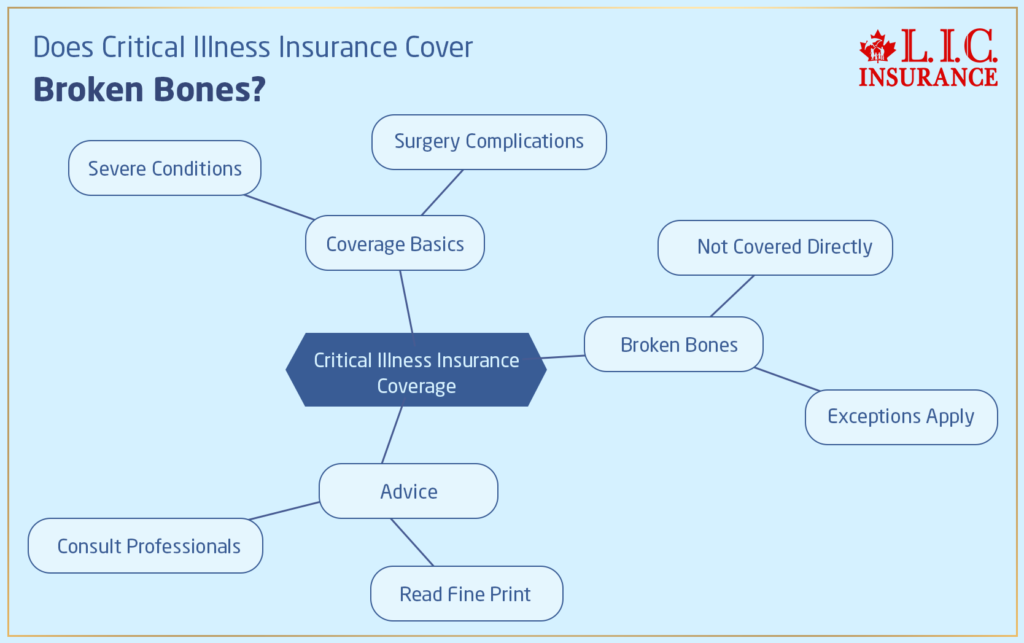
Imagine a sunny Sunday afternoon. You decide to go cycling with your friends, enjoying the breeze and the freedom that comes with it. But suddenly, your tire hits a stone, and you find yourself on the ground, wincing in pain. It’s a broken arm—a common accident, yet so unexpected. This moment sparks a whirlwind of concerns: recovery, medical expenses, and time off work. Now, imagine if a Critical Illness Insurance Policy could cover these expenses. Wouldn’t that provide a significant relief?
In today’s blog, we’ll delve deep into whether Critical Illness Insurance in Canada covers situations like broken bones. We’ll explore the scope of Critical Illness Insurance policies, share real-life stories, and help you understand how to safeguard your financial health against unforeseen medical emergencies. So, if you’ve ever wondered about the coverage details of Critical Illness Insurance in Canada, stay tuned as we unravel this crucial topic together!
The Basics
Critical Illness Insurance is intended to help relieve the financial burden of a serious diagnosis. It pays a one-off amount of money if you are diagnosed with a critical illness detailed in the policy terms. But does it cover broken bones? Let’s find out:
What Does Critical Illness Insurance Cover?
The big three, Cancer, Heart Attack or Stroke, get the bulk of the attention in Canada when talking about Critical Illness Insurance. These are obviously serious diseases that could devastate your life and your wallet. The list of covered conditions can vary significantly from one policy to another, and it’s crucial to get Critical Illness Insurance Quotes that detail which conditions are included. Remember, the essence of Critical Illness Insurance is to cover diseases that have a profound impact on your life and finances.
Beyond the Big Three: Expanding Coverage Understanding
When it comes to a critical illness diagnosis, Critical Illness Insurance policies in Canada pay a cash benefit on the diagnosis of one of the life-threatening illnesses that the policy includes in the contract. Though cancer, heart attack, and stroke are the most likely conditions to be covered, many policies extend protection to other severe conditions like multiple sclerosis, kidney failure, Alzheimer’s disease, and even life-threatening infections. Getting detailed Critical Illness Insurance Quotes will keep you fully informed on what your policy covers and what you can expect to pay. These quotations will not only state what diseases are covered but will also explain each of the respective terms and conditions. For example, a few policies might cover surgeries such as heart bypass or angioplasty — procedures that are not “illnesses” per se — but involve medical procedures that have major health consequences and costs.
Engaging with Personal Stories
Emma, a graphic designer living in Montreal, believed her Critical Illness Insurance Policy only included cancer, heart attack and stroke. She was diagnosed with severe Rheumatoid Arthritis one day. At first, Emma was concerned her condition would not be eligible for coverage. But when she checked the details of her policy, which she had sourced from comparing Critical Illness Insurance Quotes, she found it did cover the illness. Emma’s story serves as an example of the necessity of knowing the details of your Critical Illness Policy.
Exploring in Detail: What Should You Check in Your Policy
Whenever you get Critical Illness Insurance Quotes, make sure to concentrate on the following list:
Covered Conditions: Read about the conditions covered adequately. This knowledge can give you the peace of mind you will need and the financial support that will be necessary at various junctures as your story unfolds.
The Definitions: Every Critical Illness Insurance Policy in Canada defines what will be considered a “critical illness” that will actually trigger a benefit to the policyholder. It is important to know these definitions because of the basis on which and when policy payouts are made.
Exclusions & Limitations: It can be just as important to know what is not covered as to know what is covered. This information is useful for you to know if you happen to have any holes in your coverage that may require additional insurance products.
Waiting Periods: There might be a waiting period between diagnosis and payment of the benefit in some of the policies. This period has to be well-demarcated to prevent being caught off guard when it matters most.
Does Critical Illness Insurance Cover Broken Bones?

Critical Illness Insurance in Canada is a specific type of coverage designed to support you financially if you are diagnosed with a serious illness listed in your policy. Unfortunately, when it comes to broken bones, things aren’t as simple when it comes to the coverage you’d like to receive. So, let’s go through most of the situations that you can encounter and tell you how to deal with and solve them.
The Basics of Coverage
First and foremost, it is important to understand that Critical Illness Insurance policies typically do not cover injuries such as broken bones unless they result in one of the severe conditions named in the policy. So, in this case, if the broken bone causes some complication, which needs surgery, etc. and if that is covered under your policy, you can claim the same.
Pro Tip: Always take a long hard look at the list of critical conditions covered when comparing Critical Illness Insurance Quotes. Understanding each of these will give you the power to make an educated decision as to what extra coverage you need.
Why It Pays to Read the Fine Print
Toronto resident Maria learned this lesson the hard way when she broke her leg skiing. Her Critical Illness Insurance Policy actually excluded the fracture itself — meaning she had to pay a host of out-of-pocket costs in the beginning. But her situation began to change after the fracture caused a serious infection, which her policy covered.
Have you been in a situation like Maria’s? What did you know about your policy that helped, or what do you wish you had known before?
In addition, since Critical Illness Insurance does not usually cover the breaking of bones, searching at least for accident insurance and possibly even Health Insurance, which also offers coverage as a result of hospitalization and provides a full range of treatments for injuries, is the right decision. These are policies that can work with your critical illness coverage to take up the slack.
It may be a good idea to secure Critical Illness Insurance Quotes that provide the ability to do an accident rider or other additional riders, protecting the financial consequences of fractures.
Professional Help in Exploring Insurance
Insurance, especially Critical Illness Insurance in Canada, is complex. Speaking with insurance agents licensed for years, nationally recognized, and individual award holders would have totally different coverage, which would amend in the long term.
Consult with professionals from Canadian LIC who can help you review your existing coverage and seek out more appropriate alternatives. This allows them to offer personalized Critical Illness Insurance Quotes that are specific to your circumstances and health factors.
Stories from Canadians
To put this information into perspective and illustrate the difference it makes, we will share with you several stories…
John’s Story
Lisa’s Experience
Choosing the Right Critical Illness Insurance Policy
When you are shopping around for Critical Illness Insurance in Canada, follow these steps to help you choose the right policy amongst other Critical Illness Insurance companies:
Compare Quotes – Get Critical Illness Insurance Quotes from different insurance providers – compare which illnesses are covered. This also will make you more competitive in pricing and benefits.
Go With The Minute Details: Read every line on what the plan covers. Look for exclusions. Plus, do you want additional accident coverage?
Consult with Experts: Contact insurance brokers or financial planners. The Canadian LIC, a firm offering total advisory service, can also help you choose the right policy based on your circumstances.
Wrapping Everything Up
Critical Illness Insurance may not cover broken bones, but some other complications can be included in the policy; here, the scope of coverage is important. Today, we have learned that Critical Illness Insurance provides this cushion for our life-changing conditions. Considering the experiences of the people’s stories we shared, the value of good, comprehensive planning is apparent, and the peace of mind it provides cannot be understated. So, in case you remain willing to buy Critical Illness Insurance, it is now or never. For a policy that actually protects, get in touch with Canadian LIC, one of the top insurance brokerages in Canada. Remember, there is always time to secure yourself with the right financial safety net against Critical Illnesses. Engage with Canadian LIC today and take the first step towards a safer tomorrow. Your health and peace of mind deserve nothing less.
Find Out: Is it possible to cancel Critical Illness Policy?
Find Out: Can you add Critical Illness Cover to an existing policy?
Find Out: Does Critical Illness Coverage cover heart failure?
Find Out: Is death covered under Critical Illness Insurance?
Find Out: Is it possible to have two Critical Illness Policies?
Find Out: Can you take out Critical Illness Coverage without Life Insurance?
Find Out: The differences between Life Insurance and Critical Illness Insurance
Get The Best Insurance Quote From Canadian L.I.C
Call 1 844-542-4678 to speak to our advisors.

Frequently Asked Questions About Critical Illness Insurance in Canada
Critical Illness Insurance in Canada is a confusing insurance category to understand. These frequently asked questions (FAQs) can help break out the confusion and guide you in making the best decision as per your insurance requirements.
A Critical Illness Insurance Policy usually only covers an array of specified major illnesses, for example, heart attack, stroke, and cancer. The specific illnesses covered can differ among policies, so make sure to read your policy details carefully. Keep in mind these policies are created to ensure that you have a quick cash payout for you or a loved one, and you may not have to pay out a huge bill or a long list of debts; the only thing you do is focus on your recovery without being concerned about any financial burdens.
Critical Illness Insurance typically does not cover broken bones unless the broken bones progress to more severe complications, which are included explicitly in the policy; for example, a bone fracture becomes infected and requires surgery. Accident insurance, or a comprehensive Health Insurance policy that covers trauma, would more likely be a suitable fit if you simply seek to get directly compensated for breaking bones.
You will have to do a bit of research to find the best Critical Illness Insurance Quotes. Begin by looking at quotes from several insurance companies to find out what conditions are covered and how much. Having that information is a huge benefit, but consulting with insurance professionals who understand your health and financial situation is advantageous as well. Another option is platforms like Canadian LIC, which provides tailored services to ensure you get the policy that’s right for your needs.
Although broken bones would not specifically be classified as a critical illness under the terms of most normal policies, many insurers offer the option of extended coverage or riders, which also cover accidents. Typically, these add-ons come at a price but may offer more extensive coverage to protect your vehicle against different eventualities.
If in doubt as to what is covered by your Critical Illness Insurance Policy, it is advisable to speak with your insurance provider or your insurance broker, who will be able to provide a much fuller explanation. They can explain what your insurance policy will and will not cover, as well as any extra services you may want to add to your coverage. Siksha from Edmonton, for instance, discovered she was blurry on the terms of her policy, so she turned to her broker to learn her policy did not cover some types of cancers she thought it did. This understanding followed a shift in her reporting.
It is important to review your Critical Illness Insurance Policy occasionally or if you experience any major changes in health, lifestyle, or family responsibilities. The reviews help ensure that your coverage matches your needs and still provides protection from the anticipated financial risks related to critical illnesses.
With most Critical Illness Insurance policies, after you are diagnosed with one of the covered illnesses listed in your policy, you have to live for a waiting period — often 30 days — before the lump sum is paid out. This flat-rate payout is easier to help you get through a tough financial situation. So, for example, Tom from Halifax received his payout within a month of being diagnosed with a covered illness, which he used to pay his living costs and also for treatments that his Health Insurance did not cover.
The application age for critical illness is a limitation, and they are only available to people within the correct age range. Policies are available to people aged from 18 to 65 from most insurers. Nonetheless, the terms and eligibility can be quite different between providers, so be sure to ask for Critical Illness Insurance Quotes that are suitable for your age group and health status. The sooner you apply, the better the terms and rates.
Make a claim on your Critical Illness Insurance. You won’t receive a payout, as these policies do not typically offer a “return of premium” on standard terms in Canada. However, some policies may offer this feature as an optional add-on, where premiums may be returned if no claim is made by the end of the policy term. The decision to choose a return of premium (ROP) rider for financial planning, providing peace of mind and a form of savings in case the insurance was not required, was the clincher for Anita in Winnipeg.
Getting Critical Illness Insurance for a pre-existing medical condition can be tough, but it is not impossible. Others may still cover you but with the pre-existing condition excluded from the policy, or they may offer coverage but at a higher price due to the increased risk. When applying, you need to be honest about all the pertinent health information to prevent a claim from being denied later on. By comparing multiple Critical Illness Insurance Quotes, you can identify a provider that is more likely to answer positively to your specific health situation.
The right level of coverage for you is a function of a number of things, all of which combined can give a very good proxy for your current fate — your financial liabilities, your health-based risk factors, and your current income. The general idea here is that you may want a policy that can pay your bills for 1 to 2 years in the event that you fall sick and can no longer work. Talk to your insurance advisor to find the right amount of coverage for you that is in line with the future you want to create.
In Canada, the majority of Critical Illness Insurance policies provide a mechanism for amending the policy over time: for example, increasing the amount of money a policy pays out or adding new conditions to the list of covered illnesses. Meanwhile, your premiums could be subject to these adjustments if they require you to undergo more extensive medical screening. For instance, when Derek in Toronto changed the variables that he considered for insurance and thought of him as a policyholder based on different numbers and periods, he had to change his policy accordingly to remain consistent against his lifestyle change; otherwise, he was lowering what he held covered and all that.
True, a number of Critical Illness Insurance policies have family plans that also provide coverage for yourself, your spouse, and your children. This is particularly useful because the entire family can be protected by a single policy with family plans. An Ottawa resident, Emily purchased the plan to cover herself and two kids on a family plan, just in case anyone in the family was ever diagnosed with a critical illness.
If all conditions are met (like the survival period), a Critical Illness Insurance Policy pays out usually within 30 days after approval of a claim. Rajendar from Surrey describes the ease at which he received a payout which allowed him to pay for his expenses and continue to recover without having to worry about his immediate finances.
Coverage specifics: What illnesses are covered? Are there any exclusions?
Payout: Is it enough to support your requirements?
Premiums: Are they reasonable? Are they within your budget?
Insurer reputation and credibility: Is the insurer who it says they are?
Consider these factors very carefully before choosing a policy that provides the best possible protection for your situation.
For the most part, a Critical Illness Insurance payout in Canada is tax-free. This means that you are not required to pay taxes on the amount you receive, so the entire amount can go towards helping your recovery and financial fitness. Always check with a tax advisor to understand how this applies in your personal case.
Critical Illness Policies pays you out a lump-sum payment if you are ever diagnosed with one of the specific listed illnesses under the policy and whether you are still able to work or not. Disability Insurance, meanwhile, offers payments every month to replace your regular income if a sickness or injury leaves you unable to work, either until you can do so again or for a specific duration. It is imperative to appreciate this point of difference when it comes to understanding how each insurance can protect you in a different way.
The majority of Critical Illness Insurance policies have exclusions such as pre-existing conditions, certain cancers when diagnosed within 90 days of the policy being in force, and illnesses associated with drug or alcohol abuse. In order to not be caught off guard during a claim, it is important to read and understand all of their exclusionary language. Mark from Quebec only found out that his form of cancer was excluded after he came to make a claim.
With proper knowledge and the right guidance, you can make your way through understanding and choosing the best Critical Illness Insurance in Canada. Hopefully, these FAQs have answered some of the questions you might have had and got you thinking about the different considerations when shopping around for insurance. If you need to ask more questions or need expert advice, contact the experts at Canadian LIC, who can provide solutions as per your situation. Never forget, when dealing with health matters, having the proper insurance can make a big difference in how well you take care of yourself.
Sources and Further Reading
To deepen your understanding of Critical Illness Insurance and related topics, here are some useful resources that provide detailed information and guidance:
Canadian Life and Health Insurance Association (CLHIA) – The official guide to understanding Critical Illness Insurance in Canada. It offers a comprehensive overview of what Critical Illness Insurance is and what it covers.
Website: CLHIA – Critical Illness Insurance
Financial Consumer Agency of Canada (FCAC) – Offers information on insurance choices and financial planning, helping Canadians make informed decisions about Critical Illness Insurance and other financial products.
Website: FCAC – Insurance
Health Canada – While not specifically about insurance, Health Canada provides valuable health-related data that can help you understand the risks of various illnesses, potentially impacting your decisions about Critical Illness Insurance.
Website: Health Canada
Canadian Cancer Society – Provides statistics and information on cancer, one of the key illnesses covered by Critical Illness Insurance. Understanding these risks can guide your insurance coverage decisions.
Website: Canadian Cancer Society – Statistics
These resources will provide you with a solid foundation to better understand Critical Illness Insurance policies, what they cover, and how they can be a part of your overall financial strategy.
Key Takeaways
- Critical Illness Insurance typically covers major il
- It's crucial to thoroughly understand the details of your Critical Illness Insurance Policy to avoid unexpected financial burdens.
- Consider supplementary insurance such as accident insurance or Health Insurance that includes trauma coverage to fill coverage gaps.
- Stories like Maria’s illustrate the practical implications of policy specifics and highlight the importance of comprehensive planning.
- Comparing Critical Illness Insurance Quotes and consulting with experts are key in selecting the right policy that meets your needs.
- Regularly review your Critical Illness Insurance Policy to ensure coverage matches your current life circumstances and health status.
Your Feedback Is Very Important To Us
We are gathering feedback to better understand the struggles and experiences Canadians face with their Critical Illness Insurance, especially regarding coverage for broken bones. Your responses will help improve services and provide better information about insurance options. Thank you for taking the time to share your thoughts!
The above information is only meant to be informative. It comes from Canadian LIC’s own opinions, which can change at any time. This material is not meant to be financial or legal advice, and it should not be interpreted as such. If someone decides to act on the information on this page, Canadian LIC is not responsible for what happens. Every attempt is made to provide accurate and up-to-date information on Canadian LIC. Some of the terms, conditions, limitations, exclusions, termination, and other parts of the policies mentioned above may not be included, which may be important to the policy choice. For full details, please refer to the actual policy documents. If there is any disagreement, the language in the actual policy documents will be used. All rights reserved.
Please let us know if there is anything that should be updated, removed, or corrected from this article. Send an email to Contact@canadianlic.com or Info@canadianlic.com

